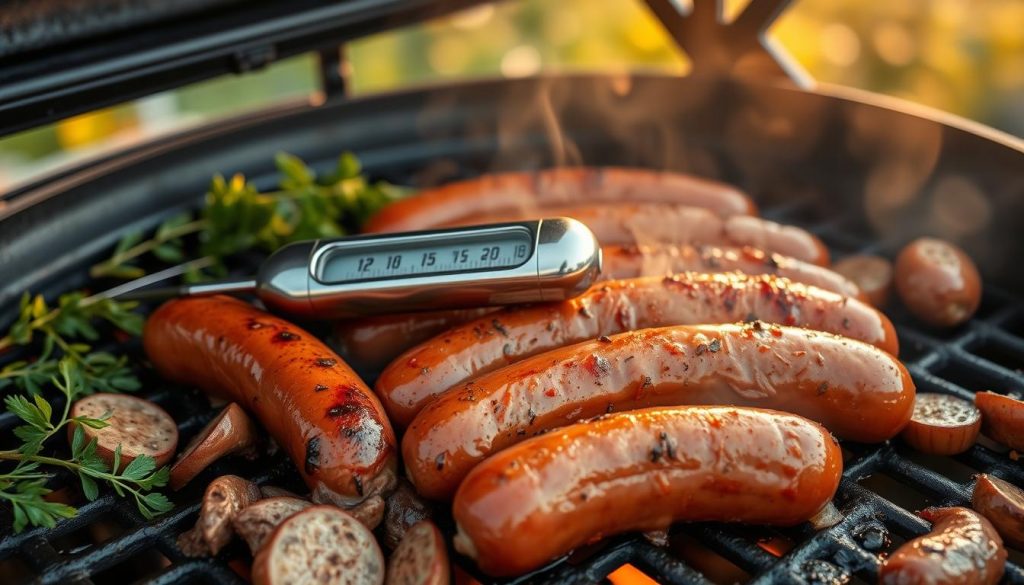Keeping bratwurst fresh can be challenging. This guide reveals the secrets of bratwurst shelf life and refrigerated storage tips. Understanding proper storage is crucial for enjoying this German delicacy at its best.
We’ll explore how long bratwurst stays good in your fridge. We’ll cover storage methods, ideal temperatures, and signs of spoilage. Our aim is to help you keep your brats tasty and safe.
Key Takeaways
- Bratwurst shelf life varies between raw and cooked sausages
- Proper refrigerated sausage storage extends freshness
- Temperature control is crucial for fresh bratwurst preservation
- Packaging plays a vital role in maintaining quality
- Recognizing spoilage signs ensures food safety
- Freezing is an option for long-term storage
- Safe handling practices prevent foodborne illness
Understanding Bratwurst: A Popular German Sausage
Bratwurst is a beloved German sausage known for its rich flavors and versatility. Let’s explore what makes this sausage special and discover its varieties and ingredients.
What Makes Bratwurst Unique
Bratwurst’s uniqueness comes from its perfect blend of meats and spices. It boasts a coarse texture and juicy interior, setting it apart from other German sausages.
The name “bratwurst” comes from Old High German. It combines “brät” (finely chopped meat) and “wurst” (sausage), hinting at its crafted nature.
Common Types of Bratwurst
German sausage varieties include numerous types of bratwurst, each with distinct characteristics:
- Nürnberger Rostbratwurst: Small, thin sausages from Nuremberg
- Thüringer Rostbratwurst: Long, spicy sausages from Thuringia
- Coburger Bratwurst: Made with a high percentage of beef
- Kulmbacher Bratwurst: Known for its garlic flavor
Traditional Ingredients and Preparation
Traditional bratwurst preparation involves carefully selecting ingredients. The main components typically include:
| Ingredient | Purpose |
|---|---|
| Pork or Veal | Base meat for texture and flavor |
| Salt | Enhances taste and acts as a preservative |
| White Pepper | Adds subtle heat |
| Nutmeg | Provides warm, slightly sweet notes |
| Marjoram | Contributes earthy, slightly bitter flavor |
The bratwurst ingredients are ground, mixed, and stuffed into natural casings. This process creates a perfect balance of flavors.
Bratwurst has become a staple in German cuisine and is enjoyed worldwide. Its unique taste and texture make it a favorite among sausage lovers.
How Long Does Bratwurst Last in the Fridge
Knowing how long bratwurst lasts in the fridge is vital for safe eating. Let’s look at storage times for raw and cooked bratwurst. This info will help you enjoy this tasty German sausage safely.
Raw Bratwurst Storage Time
Fresh, raw bratwurst doesn’t last long in the fridge. Eat raw bratwurst within 1-2 days of buying it. If you can’t cook it soon, freeze it for later use.
Cooked Bratwurst Shelf Life
Cooked bratwurst stays good longer in the fridge. Store it in an airtight container for 3-4 days. This makes cooked bratwurst great for meal prep or leftovers.
| Bratwurst Type | Refrigerator Storage Time |
|---|---|
| Raw | 1-2 days |
| Cooked | 3-4 days |
Signs of Spoilage to Watch For
Be alert for these signs of spoiled bratwurst:
- Unpleasant or sour odor
- Slimy or sticky texture
- Discoloration or mold growth
- Off-flavors or tastes
If you spot any of these signs, throw the bratwurst away. This helps prevent food poisoning. Remember, if you’re unsure, it’s best to toss it out.
“Proper storage is key to maintaining the quality and safety of bratwurst. Always follow food safety guidelines to enjoy your sausages at their best.”
Proper Storage Methods for Fresh Bratwurst
Storing fresh bratwurst correctly keeps it safe and tasty. Let’s explore the best ways to refrigerate your sausages. These tips will help you maintain their quality for longer.
Choose airtight containers or resealable plastic bags for storage. These prevent air exposure and keep out fridge odors. If using original packaging, ensure it’s tightly sealed.
Set your fridge to 40°F (4°C) or below. This slows bacterial growth and preserves freshness. Place bratwurst in the coldest part of your fridge, usually the back bottom shelf.
Follow these storage tips for best results:
- Store raw bratwurst on a plate or in a shallow container to catch any drips
- Keep bratwurst away from ready-to-eat foods to prevent cross-contamination
- Use within 1-2 days for peak freshness
- If you won’t use the bratwurst within this time, consider freezing it
Good storage practices start when you bring sausages home. By following these methods, your bratwurst will stay fresh and safe to eat.
Temperature Requirements for Safe Storage
Bratwurst freshness depends on proper storage temperatures. We’ll cover ideal fridge temps and the danger zone. This info helps maintain sausage quality and safety.
Ideal Refrigeration Temperature
Set your fridge between 35°F and 38°F (1.7°C to 3.3°C) for best bratwurst storage. This range slows bacteria growth. It also keeps flavor and texture intact.
Danger Zone Temperatures
The danger zone for bratwurst is 40°F to 140°F (4.4°C to 60°C). Bacteria grow fast in this range. Don’t leave bratwurst at room temp for over 2 hours.
Impact of Temperature Fluctuations
Steady temps are key for storing bratwurst. Frequent changes can cause condensation. This affects texture and may boost bacterial growth.
Use a fridge thermometer to keep temps stable. This helps maintain bratwurst quality and safety.
| Temperature Range | Storage Duration | Safety Level |
|---|---|---|
| 35°F – 38°F (1.7°C – 3.3°C) | 1-2 days (raw), 3-4 days (cooked) | Safe |
| 40°F – 140°F (4.4°C – 60°C) | 2 hours maximum | Danger Zone |
| Below 0°F (-18°C) | 1-2 months | Safe (frozen) |
Follow these storage temps to keep your bratwurst tasty and safe. Your sausages will stay fresh and ready to enjoy.
Packaging Tips for Extended Freshness
Smart packaging keeps bratwurst fresh longer. Airtight storage prevents air and moisture from spoiling your sausages. Here are some tips to maximize shelf life.
Vacuum sealing is highly effective for long-term bratwurst storage. It removes all air, creating a perfect seal. This method works well for both refrigeration and freezing.
No vacuum sealer? Use plastic wrap or aluminum foil. Wrap sausages tightly, squeezing out air. Place wrapped bratwurst in a zip-top bag for extra protection.
Moisture control is crucial for maintaining sausage quality. Let cooked bratwurst cool before packaging. This prevents condensation inside the container, which can cause spoilage.
- Use airtight containers or resealable bags
- Remove as much air as possible when sealing
- Label packages with the date of storage
- Store in the coldest part of your fridge
These packaging tips ensure your bratwurst stays fresh and tasty. Proper storage is essential for enjoying sausages at their best. Follow these guidelines for delicious bratwurst anytime!
Freezing Bratwurst: Step-by-Step Guide
Freezing bratwurst keeps your sausages fresh for longer. Follow these steps to store your bratwurst properly. You’ll enjoy tasty sausages for months to come.
Preparation for Freezing
Wrap each sausage in plastic wrap or aluminum foil. This stops freezer burn and keeps them fresh. For extra care, put wrapped sausages in a freezer-safe bag.
Squeeze out as much air as you can from the bag. This helps protect your bratwurst even more.

Best Freezer Storage Practices
Put bratwurst in the coldest part of your freezer, usually at the back. Label packages with dates to track storage time. For best taste, eat frozen bratwurst within 1-2 months.
At 0°F (-18°C), bratwurst stays safe to eat forever. But the flavor might change over time.
Thawing Methods
Thaw bratwurst safely to keep it tasty. The best way is to put frozen sausages in the fridge overnight. For faster results, use the cold water method.
To use cold water, put sealed packages in cold water. Change the water every 30 minutes until thawed.
| Thawing Method | Time Required | Best For |
|---|---|---|
| Refrigerator | 8-24 hours | Planned meals |
| Cold Water | 1-2 hours | Same-day cooking |
| Microwave | 5-10 minutes | Immediate use |
Never thaw bratwurst at room temperature. This can cause harmful bacteria to grow. Follow these tips to become a bratwurst freezing expert.
Signs Your Bratwurst Has Gone Bad
Spotting spoiled bratwurst is key for food safety. Learn how to check your sausages for quality. Regular checks help prevent foodborne illness.
Visual cues are your first defense. Fresh bratwurst should be pinkish-gray. Discoloration, like green or gray patches, means it’s time to toss it. Mold growth is another clear spoilage sign.
The smell test is crucial too. Fresh bratwurst has a mild, meaty scent. Sour, rancid, or ammonia-like odors indicate spoilage.
Texture changes can show spoilage. Slimy or sticky surfaces are red flags. Unusually soft or mushy casings mean it’s best to discard the bratwurst.
| Indicator | Fresh Bratwurst | Spoiled Bratwurst |
|---|---|---|
| Color | Pinkish-gray | Green, gray patches |
| Smell | Mild, meaty | Sour, rancid, ammonia-like |
| Texture | Firm, dry surface | Slimy, sticky, mushy |
| Mold | None | Visible growth |
When in doubt, throw it out. It’s safer than eating spoiled bratwurst. Check your sausages often to enjoy them safely.
Safe Handling and Food Safety Guidelines
Proper sausage food safety is vital when handling bratwurst. Let’s explore key practices to keep your bratwurst safe and tasty. These tips will help you prepare delicious meals without compromising on safety.
Cross-contamination Prevention
Use separate cutting boards for raw meats and other foods. Wash your hands before and after handling raw bratwurst. Clean all utensils and surfaces that touch raw sausages.
Proper Cooking Temperatures
Follow cooking temperature guidelines for bratwurst safety. Use a meat thermometer to check the internal temperature. It should reach 160°F (71°C) to kill harmful bacteria.

Kitchen Hygiene Practices
Keep your kitchen clean to promote food safety. Sanitize countertops, sinks, and appliances regularly. Store raw bratwurst on the bottom shelf of your fridge.
| Bratwurst Handling Precautions | Why It’s Important |
|---|---|
| Use separate cutting boards | Prevents cross-contamination |
| Cook to 160°F (71°C) | Kills harmful bacteria |
| Store on bottom shelf | Prevents dripping onto other foods |
| Wash hands frequently | Reduces spread of bacteria |
Follow these sausage food safety guidelines for safe and tasty meals. Your diners will enjoy delicious bratwurst without any worries. Remember, safety first when preparing your favorite sausage dishes.
Tips for Maximizing Bratwurst Shelf Life
Extend your bratwurst’s freshness with these simple tips. Learn how to keep your German sausages tasty for longer. Discover easy ways to maintain their quality and flavor.
Storage Container Selection
Choose the right container for optimal bratwurst storage. Airtight containers or resealable plastic bags work best. They prevent moisture and freezer burn, keeping your sausages fresh.
Refrigerator Organization
Store bratwurst in the coldest part of your fridge. This is usually the bottom shelf. Keep raw meats separate from other foods to avoid cross-contamination.
Smart organization helps maintain a steady temperature. This extends the shelf life of your bratwurst.
Quality Maintenance Tips
Handle bratwurst with clean hands and utensils. Don’t leave it at room temperature for long. Consider freezing if you’re not eating it soon.
Follow these steps to enjoy fresh bratwurst longer. Your taste buds will thank you for preserving that authentic German flavor.




